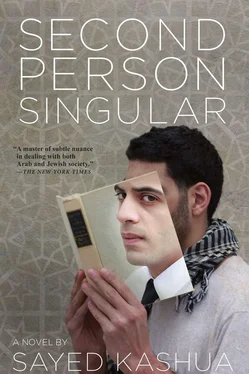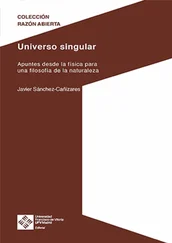“Amir,” I heard my mother’s voice behind me. She came out of um-Bassem’s courtyard toward me, her head covered with the colorful scarf she wore when visiting a mourner’s tent. Her eyes were puffy and red and she nearly hugged me but the look on my face and the way I shifted my gaze to the men in the road deterred her and she merely stroked my arm.
“Do you have laundry?” she asked, taking my little bag, probably hoping I did so that she could do something for me. “Are you hungry?”
“No,” I said, and I followed her into the house.
“How are you?” she asked, once the door closed and the two of us were alone.
“I’m fine.”
“Poor um-Bassem. But it’s better this way. More rest for her and for her daughters. She didn’t eat during these last months. Can I get you anything?”
“No, thank you, I had a falafel in Petach Tikva.”
“It’s good you came.”
“Yeah.”
“They’ve been waiting for Bassem all day. He just showed up now.”
“I heard.”
“So everything’s okay with you? Work?”
“Yeah, everything’s fine.”
“You have your own washing machine in the apartment?”
“Yes,” I said, and I knew she was looking at my shirt, which I hadn’t worn in over four years but had picked out of the closet that morning so that I could wear something that wouldn’t look strange to my mother and her neighbors.
“Don’t worry, Mom,” I said, walking toward the bathroom, trying to steady the tremble that had risen up from the balls of my feet to my knees and chest. “I have money.”
From the bathroom I could hear the teary voices of the women as they parted with um-Bassem. “Say hi to Daddy,” I heard the oldest daughter wail, and I assumed that the washing ceremony had been completed and that the coffin was being walked out of the house in the hands of the men.
“Amir,” my mother said, knocking on the bathroom door after a few minutes. “Amir, the funeral procession is leaving.”
Several dozen men trailed behind the coffin, which was carried to a nearby mosque on the shoulders of a few young men. The pace was brisk, as though everyone wanted to get this over with. Bassem looked a little tired but he smiled warmly whenever someone shook his hand and consoled him.
“Allah yirakhma,” I said, too, as I shook his hand.
“ Ta’ish,” he said, and I could tell from his face that he didn’t recognize me.
A young man near me answered his phone, which rang with the opening chords of Umm Kulthum’s “Enta Omri.” “I’m at a funeral right now,” he whispered into the phone, “I’ll call you later. Um-Bassem. Yes, Bassem. Died today. Ta’ish, ’bye.”
A few dozen more men waited at the entrance to the mosque. The worshippers followed the body inside and began to say the prayer for the dead before burial. I stayed outside and tried to keep my eyes on the ground so that I wouldn’t see familiar faces.
“Hello, Amir,” said Nabil, a former classmate. “How are you?” he said, coming up to me and shaking my hand.
“Good, thanks.”
“Where’ve you been? We never see you around,” he said.
“In Jerusalem.”
“Oh, why? You still in school?”
“No. I graduated.”
“Wow, you were always one of the smart kids, weren’t you? So, do you make any money with this college job?”
“ Alhamdulillah .” Thank God.
“So why don’t you take your mother with you? Poor thing, I feel bad for her, all alone in the village, isn’t it a shame?” He smiled and looked around to see if anyone else had heard him, if anyone else was laughing along with him. “You know, as it says in the Koran, ‘show compassion for your parents.’”
“What about you?” I asked in a dry tone, signaling that I really didn’t want to hear anything more from him.
“ Walla, as our Jewish cousins say, blessed be God,” he said, kissing the back of his hand and thrusting it up toward the sky.
Nabil graduated elementary school without knowing how to read. Of the forty kids in our grade, there were ten or so who were completely illiterate. The majority just dropped out of school. Some went to trade school, with the best of the bunch learning car mechanics and the rest going into carpentry and metalwork. I couldn’t remember which route Nabil had taken, if any at all.
He leaned against the outside wall of the mosque and chatted quietly with his friends, occasionally stealing a glance in my direction. Nothing had changed. They were the same old kids, only larger. I could still see them at recess, sitting on the dilapidated benches and laughing at me.
“You got a hundred only ’cause your mother’s been going down on the principal,” they’d say. Or, “If your mother wasn’t a teacher in this school we would fuck you up bad.”
I’d often find notes with similar messages in my school bag, spelling mistakes and all. My mother was a teacher in the village’s only junior high. She never taught one of my classes, but that didn’t matter. My mother was different from the other teachers at the school. The kids cursed out all of the other teachers, ridiculed them behind their backs, but they would never dare tarnish their honor. My mother’s honor, all the kids knew, was free for the taking.
That’s how I learned that my mother used to show her tits to all the kids in the class; that my mother wore red bras and short skirts; that my mother was ousted from her village for whoring; that at night, after I went to sleep, my mother hosted all sorts of men in her bed; that she smoked cigarettes and drank alcohol; that she collaborated with the authorities; that she slept with policemen; that she slept with the principal; that they did it in the school library; that she’d been seen dancing at nightclubs in Petach Tikva; that she was sleeping with the math teacher, the history teacher, and the supervisor; that on the class trip she’d been seen peeing in the bushes and that she, for a fact, wore no underwear.
“Don’t believe a single word they say,” um-Bassem would tell me, even though I never told her what the other kids said. “Your mother is more honorable than all the rest of this trashy village. You must know that.”
Then, in junior high, I started to pray. I fasted during Ramadan and went to the religion lessons that our Koran teacher gave at the local mosque. During junior high I didn’t miss a single Friday prayer service. I became religious. My mother was a good mother. The proof: her son was a devout Muslim. I begged her to cover her hair, “For me,” for her to pray, at least on Friday, to stop smoking, to put in for a transfer to a different school, to transfer me to a different school in a different village. I didn’t mind taking the bus every morning or even walking to Kfar Kassem so long as it meant that I wouldn’t have to suffer kids like Nabil, leaning against the school walls and laughing at me.
I couldn’t figure out how it was that these overgrown kids could still intimidate me. You idiots, you assholes, if only you knew what I know. If only you knew what you look like to people who don’t live in these little hole-in-the-wall towns. If only you could see how lame your lives are. If you had even the slightest awareness of your social status, you’d lock yourself up in your house and never come out. The peak achievements of your lives are to be in charge of a construction site or to make your Jewish clients happy. Compassion is what you evoke in me, you and your big cars and your fancy houses. None of you will ever manage to escape from the trap in which you were born; none of you will ever venture beyond the boundaries of your village, boundaries that were drawn by another man’s hand. And especially you, the men, who think you’re so tough and manly, not scared of a thing, your voices so deep and strong they can stop a whole neighborhood in its tracks, you are the very essence of human trash. Keep on prancing around with your guns, keep on puffing up your chests while you do the Debka dance at weddings, keep on marrying virgins and let them preserve your honor and your male delusions. I know things you will never know; I’ve seen worlds you will never see. I’ve gone to places where you and your children will never be wanted. Yeah, me, the son of your whore, I will mock you to your face. I have nothing but disdain for you. Only I know what you’re worth.
Читать дальше












